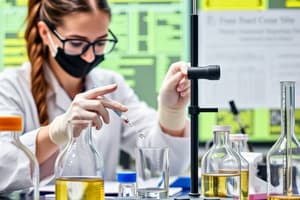Podcast
Questions and Answers
What is the main difference between 'accurate' and 'precise' in the context of measurement?
What is the main difference between 'accurate' and 'precise' in the context of measurement?
- Accuracy is a measure of the average of a set of measurements, while precision is a measure of the range of a set of measurements.
- Accuracy refers to how close repeated measurements are to each other, while precision refers to how close a measurement is to the true value.
- Accuracy is a qualitative measure, while precision is a quantitative measure.
- Accuracy refers to how close a measurement is to the true value, while precision refers to how close repeated measurements are to each other. (correct)
Which type of data is often collected through surveys and questionnaires?
Which type of data is often collected through surveys and questionnaires?
- Quantitative data
- Experimental data
- Theoretical data
- Qualitative data (correct)
What is the purpose of an 'experimental control' in an experiment?
What is the purpose of an 'experimental control' in an experiment?
- To measure the dependent variable
- To manipulate the independent variable
- To keep other variables constant (correct)
- To eliminate the controlled variable
A scientist is investigating the effect of pH on the growth of a certain plant. What is the independent variable in this experiment?
A scientist is investigating the effect of pH on the growth of a certain plant. What is the independent variable in this experiment?
What is the purpose of a 'hypothesis' in a scientific experiment?
What is the purpose of a 'hypothesis' in a scientific experiment?
Which type of error is caused by faulty equipment or a faulty measurement technique?
Which type of error is caused by faulty equipment or a faulty measurement technique?
What is the formula to calculate the percentage change of a numerical data set?
What is the formula to calculate the percentage change of a numerical data set?
Flashcards are hidden until you start studying
Study Notes
Understanding Cognitive Verbs
- Identify: recognize and name something
- Describe: provide a detailed account of something
- Explain: provide reasons or causes for something
- Predict: forecast or prophesy something
- Compare: identify similarities and differences between two or more things
- Justify: provide a valid reason or excuse for something
- Evaluate: assess or judge the quality or value of something
Understanding Data Types
- Quantitative data: numerical data that can be measured and compared
- Qualitative data: non-numerical data that describes characteristics or qualities
Measuring Equipment
- Different measuring equipment is used under different conditions
- Knowledge of which equipment to use in various situations is essential
Accuracy and Precision
- Accurate: close to the true value
- Precise: consistent and reliable, but not necessarily accurate
Variables in Experiments
- Independent variable: changed by the experimenter to observe its effect
- Dependent variable: affected by the independent variable
- Controlled variable: kept constant to ensure a fair test
Controlled Variables and Experimental Control
- Controlled variables: variables that are kept constant to ensure a fair test
- Experimental control: a variable that is intentionally changed by the experimenter
Fair Test
- A fair test is an experiment where only one variable is changed at a time
Hypothesis
- A hypothesis should be written in the "if, then, because" format
- It correctly links independent and dependent variables
Errors in Measurement
- Random errors: unpredictable and uncontrollable errors
- Systematic errors: predictable and controllable errors
- Reasons for errors: human error, equipment limitations, and environmental factors
- Minimizing errors: using multiple measurements, improving equipment, and controlling environmental factors
Data Analysis
- Calculating mean, median, mode, and percentage change of a numerical data set
- Reading, analyzing, and evaluating data from a figure
Drawing Scientific Figures
- A scientific figure should be accurately and clearly drawn
Validity and Reliability
- Validity: how well a measurement measures what it's supposed to measure
- Reliability: how consistent the measurement is
Studying That Suits You
Use AI to generate personalized quizzes and flashcards to suit your learning preferences.




